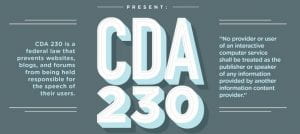

The Communications Decency Act (CDA) was originally enacted with the intention of shielding minors from indecent and obscene online material. Despite its origins, Section 230 of the Communications Decency Act is now commonly used as a broad legal safeguard for social media platforms to shield themselves from legal liability for content posted on their sites by third parties. Interestingly, the reasoning behind this safeguard arises both from defamation common law, and constitutional free speech laws. As the internet has grown, however, this legal safeguard has gained increasing criticism. However, is this legislation actually undesirable? Many would disagree as section 230 contains “the 26 words that created the internet.”
Origin of the Communications Decency Act
The CDA was introduced and enacted as an attempt to shield minors from obscene or indecent content online. Although parts of the Act were later struck down for first amendment free speech violations, the Court left section 230 intact. The creation of section 230 was influenced by two landmark court decisions of defamation lawsuits.
The first case was in 1991, and involved an Internet site that hosted around 150 online forums. A claim was brought against the internet provider when a columnist of one of the online forums posted a defamatory comment about his competitor. The competitor sued the online distributor for the published defamation. The courts categorized the internet service provider as a distributor because they did not review any content of the forums before the content was posted to the site. As a distributor, there was no legal liability, and the case was dismissed.
Distributor Liability
Distributor Liability refers to the limited legal consequences that a distributor is exposed to for defamation. A common example of a distributor, is a bookstore or library. The theory behind distributor liability is that it would be impossible for distributors to moderate and censor every piece of content that they disperse because of the sheer volume, and the impossibility of knowing whether something is false or not.
The second case that influenced the creation of section 230, was Stratton Oakmont, Inc. v. Prodigy Servs. Co., in which the court used publisher liability theory to find the internet provider liable for the third party defamatory postings published on its site. The court deemed the website a publisher because they moderated and deleted certain posts, regardless of the fact that there were far too many postings a day to regulate each one.
Publisher Liability
Under common law principles, a person who publishes a third-party’s defamatory statement bears the same legal responsibility as the creator of that statement. This liability is often referred to as “publisher liability,” and is based in theory that a publisher has the knowledge, opportunity, and ability to exercise control over the publication. For example, a newspaper publisher could face legal consequences for the content located within it. The court’s decision was significant because it meant that if a website attempted to moderate certain posts, it would be held liable for all posts.
Section 230’s Creation
In response to the Stratton-Oakmond case, and the ambiguous court decisions regarding internet services provider’s liability, members of Congress introduced an amendment to the CDA that later became Section 230. The Amendment was specifically introduced and passed with the goal of encouraging the development of unregulated, free speech online by relieving internet providers from any liability for their content.
Text of the Act- Subsection (c)(1)
Section 230 further provides that…
The language above removes legal consequences arising from content posted on their forum. Courts have interpreted this subsection as providing broad immunity to online platforms from suits over content of third parties. Because of this, section 230 has become the principal legal safeguard from lawsuits over sites content.
The Good
- Section 230 can be viewed as being one of the most important pieces of legislation that protects free speech online. One of the unique aspects of this legislation is that it essentially extends free speech protection, applying it to private, non-governmental companies.
- Without CDA 230, the internet would be a very different place. This section influenced some of the internet’s most distinctive characteristics. The internet promotes free speech and offers the ability for worldwide connectivity.
- The CDA 230 does not fully eliminate liability or court remedies for victims of online defamation. Rather, it makes only the creator themselves liable for their speech, instead of the speaker and the publisher.
The Bad
- Because of the legal protections section 230 provides, social media networks have less of an incentive to regulate false or deceptive posts. Deceptive online posts can have an enormous impact on society. False posts have the ability to alter election results, or lead to dangerous misinformation campaigns, like the QAnon conspiracy theory, and the anti-vaccination movement.
- Section 230 is twenty-five years old, and has not been updated to match the internet’s extensive growth.
- Big Tech companies have been left largely unregulated regarding their online marketplaces.
The Future of 230
While section 230 is still successfully used by social media platforms, concerns over the archaic legislation have mounted. Just recently, Justice Thomas, who is infamous for being a quiet Justice, wrote a concurring opinion articulating his view that the government should regulate content providers as common carriers, like utilities companies. What implications could that have on the internet? With the growing level of criticism surrounding section 230, will Congress will finally attempt to fix this legislation? If not, will the Supreme Court be left to tackle the problem themselves?


